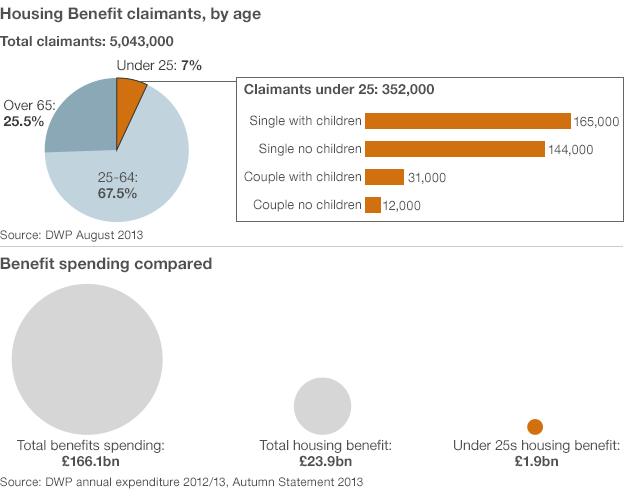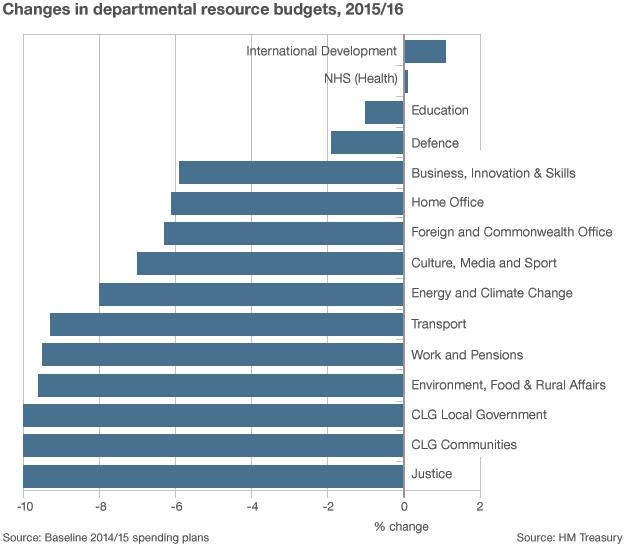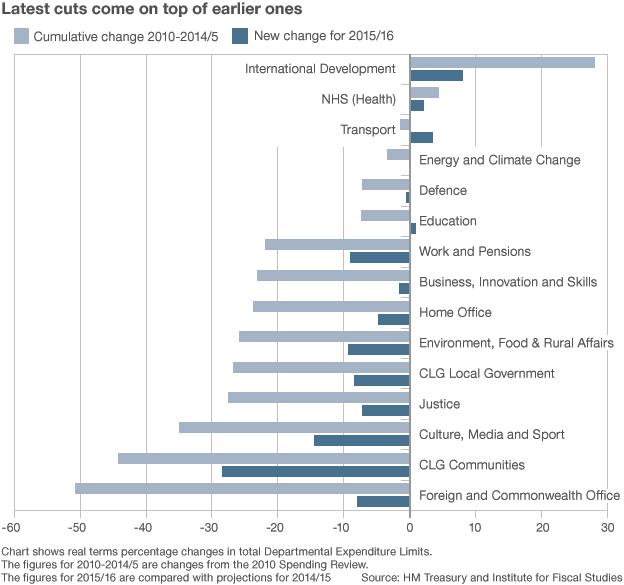George Osborne targets welfare as he warns of £25bn more cuts
- Published
- comments
Chancellor George Osborne warns 2014 will be a "year of hard truths"
A further £25bn spending cuts - much of it from the welfare budget - will be needed after the next election, Chancellor George Osborne has warned.
He said more austerity lay ahead, as the job was "not even half done".
He suggested making welfare savings by cutting housing benefit for under-25s and restricting council housing for those earning over £65,000 a year.
But Deputy Prime Minister Nick Clegg said targeting the working-age poor was "extreme... unrealistic and unfair".
The Lib Dem leader said he had a "very different vision" from the Conservatives about how to balance the books during the next Parliament and believed the wealthy should pay more in tax.
The £25bn figure is in line with the already announced intention to balance the government's books by 2018. It suggests cuts will continue at the same rate as during the current Parliament.
BBC political editor Nick Robinson said Mr Osborne's announcement was as much about politics as economics.
Mr Osborne, he said, "wants to to set the political baseline for the economic argument in the run up to the next general election", in the process setting a test for both the Lib Dems and Labour.
'Long way to go'
In his speech, Mr Osborne warned the welfare budget could not "be protected from further substantial cuts", saying he was beginning "not ending" a debate on the "difficult choices" that he believed had to be made.
Only by reducing welfare, he suggested, could a future government avoid either spending cuts in areas such as education, "big tax rises", or increased borrowing.
Mr Osborne has argued the savings needed after 2015 can be found entirely from spending cuts, with welfare accounting for about half of the £25bn targeted - the remainder coming from a further squeeze on departmental budgets.

Although the chancellor said the government's economic strategy was working, with the deficit down by a third since 2010, he warned that the job of repairing the public finances would take many more years.
"It is too early to say the job is done," he said. "It is not even half done."
The UK, he said, was "borrowing around £100bn a year - and paying half that money a year in interest just to service our debts".
'Ideological'
He added: "We've got to make more cuts. That's why 2014 is the year of hard truths - the year when Britain faces a choice.
"Do we say 'the worst is over, back we go to our bad habits of borrowing and spending and living beyond our means and let the next generation pay the bill'?
"Or do we say to ourselves 'yes, because of our plan, things are getting better - but there is still a long way to go and there are big, underlying problems we have to fix in our economy'?"
Asked earlier if some pensioner benefits could be means-tested the chancellor told BBC Radio 4's Today programme the Conservatives' values had not changed, suggesting they would continue to support all pensioners getting things like the winter fuel allowance, irrespective of income.
He said changing universal benefits for pensioners would save only "tens of millions" of pounds.
Issues that he did highlight as possible areas for savings were the payment of housing benefit to people aged under 25 and also people living in council houses while earning more than £65,000 a year.
The government estimates between 11,000 and 21,000 social tenant households have incomes of more than £60,000 a year and should pay a level of rent which "better reflects what they can afford".
Nick Robinson said the amount that could be recouped from well-off council-house dwellers was "not huge".
While housing benefit for under-25s was a larger expense - it costs about £2bn a year - he said it was nowhere near the total savings the chancellor was suggesting.

At his monthly news conference, Mr Clegg said the "black hole" in the government's finances needed to be addressed and he fully supported the government's aim of eliminating the structural deficit by 2017-8.
But he said he strongly opposed welfare cuts on a scale set out by Mr Osborne and said his party would set out its own plans in due course to do it in a "fairer way".
Expecting "all future sacrifices [to come] from the working poor who are dependent on welfare" was "unrealistic and unfair", he said.
The plans, he added, showed the Conservatives wanted to "remorselessly pare back the state for ideological reasons" and make "cuts for cuts sake".
Deputy Prime Minister Nick Clegg: "You have to spread the burden as fairly as possible"
Labour say they would match the government's overall spending plans in 2015-6 but would have different priorities from the coalition.
Shadow chancellor Ed Balls said: "George Osborne is desperate to stop talking about the cost-of-living crisis on his watch. But that won't stop working people from doing so as they are on average £1,600 a year worse off under the Tories and prices are still rising faster than wages.
"Nor will the chancellor admit the reason why he is being forced to make more cuts is because his failure on growth and living standards has led to his failure to balance the books by 2015.
"This failure means Labour will have to make cuts and in 2015-16 there will be no more borrowing for day-to-day spending.
Shadow Chancellor Ed Balls said Labour would reduce the deficit "in a fair way"
"But we will get the deficit down in a fair way, not give tax cuts to millionaires. And we know that the way to mitigate the scale of the cuts needed is to earn and grow our way to higher living standards for all."
The TUC said the level of cuts proposed by Mr Osborne would "cause real pain to hard-working people" but the CBI said the government's strategy of tackling the deficit and boosting growth was "beginning to reap some positive results".
The Institute for Fiscal Studies says the £25bn spending cuts target looks "tough" to achieve, particularly if a future government continues to ringfence spending on the health service and schools in England, as well as protecting pensions.
On Sunday, David Cameron promised older voters the state pension would continue to rise by at least 2.5% a year if the Conservatives won the next election.
How government department budgets have been cut:
- Published6 January 2014
- Published6 January 2014
- Published6 January 2014
- Published5 January 2014
- Published3 January 2014

